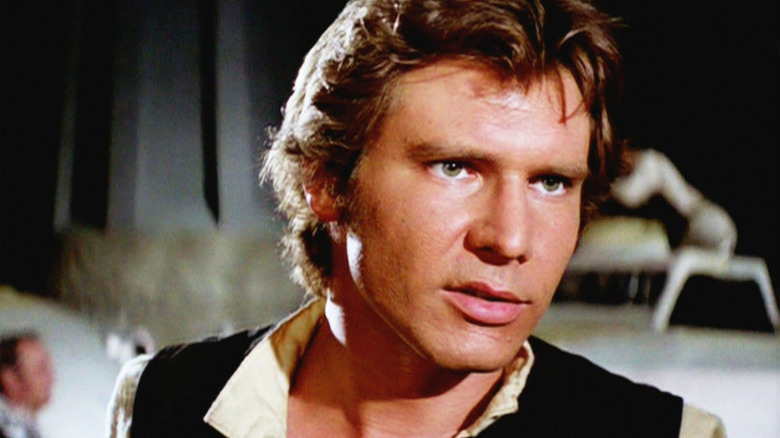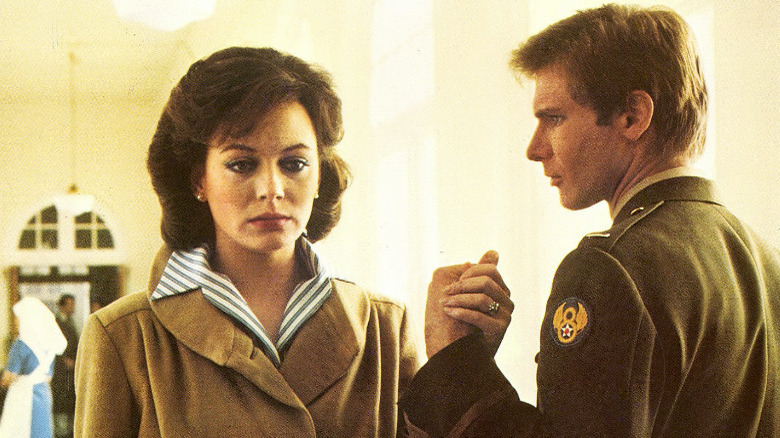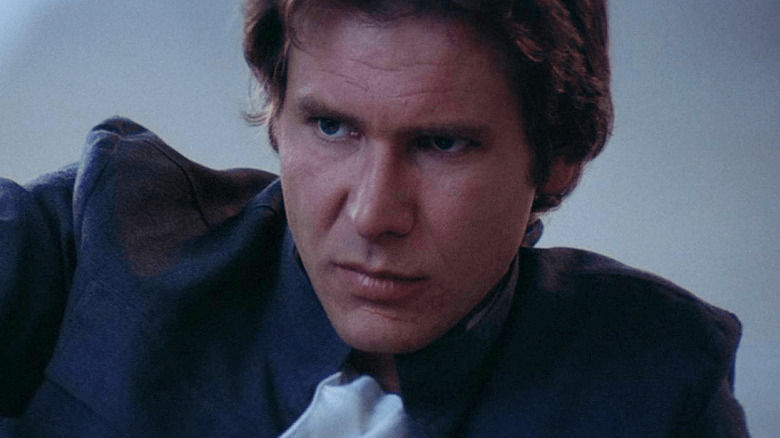The Chance To Finally Play A Romantic Lead Lured Harrison Ford Into A Box Office Bomb
Legendary Hollywood men typically stick to specific archetypes when playing the romantic lead in their films. Where Humphrey Bogart was often coarse and cynical with a heart of gold, Cary Grant tended to be debonair and sharp-witted with a mischievous streak. At the peak of his movie stardom, Harrison Ford had a touch of both those gents. He was a cocky scoundrel who bore his skepticism like a shield yet would allow himself to be unguarded and even sweet in the right company. Ford was also just as foxy donning a fedora as he was rocking the adorkable getup of a mild-mannered professor.
After breaking out as the suave cosmic reprobate Han Solo in "Star Wars: A New Hope," Ford co-starred in Jeremy Paul Kagan's 1977 Vietnam War veteran drama, "Heroes" (a film he worked on prior to "A New Hope" reaching theaters), and Guy Hamilton's 1978 "Guns of Navarone" sequel, "Force 10 from Navarone." Notably, neither of those movies called on Ford to put his skills as a romantic lead to the test, much like his previous roles in "A New Hope" and "American Graffiti." That would change soon after, however, with Peter Hyams's "Hanover Street," though not in the way Ford had hoped.
Ford didn't have much faith going in
Released in 1979, "Hanover Street" casts Harrison Ford as David Halloran, an American pilot who falls for Margaret Sellinger (Lesley-Anne Down), a married English nurse, while stationed in London during WWII, only to end up trapped behind enemy lines with her husband, Paul (Christopher Plummer). According to Brad Duke's 2015 book, "Harrison Ford: The Films," Ford wasn't chomping at the bit when Peter Hyams broached him about starring in the wartime melodrama while they were on the set of "Force 10 from Navarone." Filming on "Force 10" was over-schedule by then, and the actor wasn't keen on being far away from home so soon after. Ford came around, however, after the two spent an evening discussing the movie in his trailer.
While Ford cited Hyams' "monomaniacal attitude" as a factor in his decision, it was his desire to finally play a romantic lead that won him over:
"At that state in my career, I'd made 'American Graffiti,' 'Star Wars,' 'Heroes' and 'Force 10 from Navarone' and I'd yet to kiss a girl or be involved romantically. Then along came this love story and I agreed to do it, expecting that the script, which I didn't have total faith in, would be changed as we went along ... ."
Those promised rewrites never happened, though, and reviews for "Hanover Street" were far from flattering upon its release. Vincent Canby of The New York Times, in particular, loathed the film, writing that the romantic adventure drama was a cliché-ridden work of "nonsense, spread on so thickly, [it] seems essentially cynical." Audiences mostly stayed away too, resulting in a $3 million take at the domestic box office and giving Ford his third critical and financial dud in a row after "Heroes" and "Force 10."
The evolution of Ford as a romantic lead
Where Harrison Ford began his run as a romantic lead playing (in the actor's eyes, at least) a standup guy who ultimately does the "noble" thing in "Hanover Street," his actual legacy in that area is much more complicated. The actor continued to play rapscallions for much of the 1980s thanks to his roles as Indiana Jones and Han Solo, with his romantic appeal linked to a mix of the heroes' individualism and their rugged good looks. At the same time, these characters could be problematically aggressive in the pursuit of their love interests, if not to the violent extreme that Ford's Rick Deckard is during his "seduction" of Rachael (Sean Young) in "Blade Runner."
In her 2020 book, "Harrison Ford: Masculinity and Stardom in Hollywood," writer Virginia Luzón-Aguado argues that Ford began to soften and evolve his image as a leading man in the '90s, becoming "the epitome of heroic and virtuous fatherhood" in films like "Air Force One" and his outings as Jack Ryan. This was also the period in which Ford stretched his wings as a romantic lead, with Sydney Pollack's "Sabrina" remake and Ivan Reitman's screwball comedy adventure "Six Days, Seven Nights." Concurrent with all that, Ford continued to explore the dark side of his romantic appeal too, culminating in his antagonistic turn in Robert Zemeckis' 2000 Hitchcock riff, "What Lies Beneath."
Since then, Ford has mostly moved away from being a romantic lead in his films. These days, he can more often be found playing mournful widowers, loving husbands, or gruff found-father figures, even when reprising his best-known characters in legacy sequels. For the most part, though, that evolution has served him well. It's to Ford's credit as an actor that he's made the transition so seamlessly.


